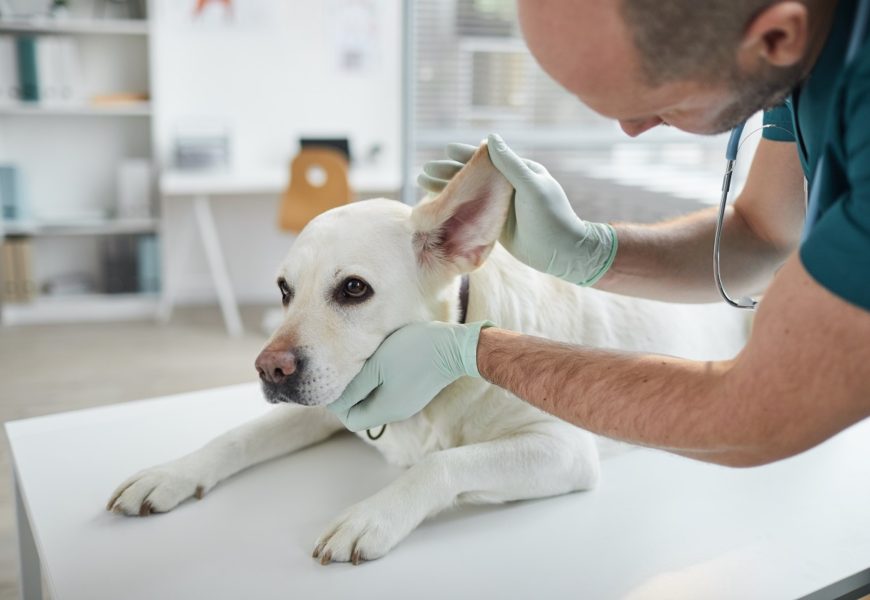Our dogs are great as they are, but have you ever wished they could talk? Just tell you what they wanted instead of chewing up something or barking their heads off until you figured it out? Sorry, I can’t help you there and, boy, would it make my work easier. Instead, I will give you some ways that your dog may be telling you that there’s an issue – even without being able to talk.
Bad Breath
The aromas of your dog’s mouth are a good indication of the health therein. Not that “normal” dog breath is anything to write home about, but bad dog breath might be.
Abnormally stinky odors from your dog’s mouth can be an indicator of oral issues. Dental issues are a common source of odor from a dog’s mouth due to the accumulation of bacteria on the teeth and gums. Abscesses can form along tooth roots and then drain into the mouth, releasing foul smells. Severe accumulation of tartar on the teeth can build up to the point that it traps food and hair, causing pockets of rotting materials that smell less than nice.
Another significant cause of mouth odor can occur when tumors grow in the mouth. If the tumors cause enough pain, the dog may not want to swallow or chew normally. When this happens, stale saliva and food can begin to smell. In some cases, the tumor itself can outgrow its blood supply and begin to decay as well.
If your dog’s mouth becomes a source of unpleasantries, it is likely worth a quick glance inside. Even if you don’t see anything, a good oral exam by a veterinarian is probably in order.
Going Off Food/Drink
For most dogs, one of life’s greatest pleasures is wolfing down food. So, when your dog decides to turn his nose up at supper, you can rest assured that something isn’t right.
The thing about reduced (or absent) appetite in your dog is that it is not necessarily specific to any one problem. It could be that there is a mouth issue as mentioned. It could be that there is a digestive issue. It could be that there is a problem with his metabolism or organ function. I think you get the point.
If your dog skips a meal, it is not necessarily a cause to think the worst, but it is certainly something to monitor. And if the lack of food interest continues for a few days, then you should seek care for your dog – and sooner if the refusal involves drinking as well.
Shaking His Head Excessively
I’m not talking about the shaking that gets you all wet after a dog returns a retrieve – or maybe I am. Wet ears are a major cause of ear issues, and ear issues are a major reason for excessive head-shaking. Minor causes include parasites and abnormal growths within the ear canal.
Inflammation of the ear canals creates irritation and infections, leading to shaking and scratching. Scratching causes trauma to the skin around the ears that can also become infected. Excessive shaking can lead to ruptured blood vessels and large hematomas in the pinnae (floppy part of the ear), which require surgical correction.
Take care of shaking early by determining the initiating cause to prevent having to deal with secondary problems on top of the original issue.
Scooting On the Rear
Butt flop. Scooter rooter. Whatever you like to call this unique little move where your dog literally lifts up his hind legs, moves the tail off to the side, and pulls his butt along the ground, it is not normal and indicates a problem.
The problem is likely an issue involving the anal glands. These little pockets of glandular production can function for the life a dog without the owner ever knowing they are there. But when they do not function correctly, the evidence is striking.
The unnatural dance of the anal glands is because they are full and not emptying correctly. The cause of this is usually due to duct closure from something pushing it closed or swelling shut. Determine and correct the primary reason for duct malfunction and your dog’s scooting will stop.
Canary in the Mine
Speaking of clogged anal glands, when the clog is due to ducts that are swollen shut, this is in itself a warning sign of allergies.
When allergies (overreactions of the immune system) occur in dogs, they result in inflammation of the skin. The typical reaction of a high-level allergic condition is scratching and self-trauma of the skin leading to hair loss, infection, and other pathology. However, when the allergies are very mild or just starting, the anal gland ducts and ear canals are some of the first places to indicate the problem.
The ducts of the anal glands – as well as the ear canals – are both simply invaginations of skin leading to the gland (or eardrum as the case may be). When these become inflamed even a little, they swell and bad things begin to happen. Understand that when these areas have issues, allergies might be part, or all, of the problem.
Nocturnal Coughing
If your dog seems fine during the day but then you catch him coughing consistently at night, this can indicate a heart problem.
Coughing is not only a respiratory symptom but can indicate a cardiovascular problem. When the heart enlarges too much, it can begin to have problems pumping, causing fluid buildup in the lung tissues. It can also physically put pressure on the airways and aggravate them. Both of these can result in a cough.
Coughs that are primarily at night, and certainly those that persist all day, should be investigated.
Thinning Hair
There are many reasons for hair loss; however, many people don’t realize that thinning of the hair can be a sign of a hormonal problem. Hormones are controlled by the endocrine system, and there are several hormones that also affect hair growth.
Hairs go through several phases before eventually falling out and being replaced. But not all the hairs are in the same phase of the growth cycle at the same time so that your dog is never without hair. Certain endocrine changes can cause changes in the hair growth phases, resulting in more hairs falling out at the same time. This causes thinning.
Abnormal hair coats might indicate the need for blood testing for endocrine problems.
Sudden Weight Changes
Changes of weight are normal. An extended period of high work/play load can result in loss of weight. Similarly, a period of less work and more feed will result in more weight. These normal changes should occur so slowly that you wake up one day and “suddenly” realize that your dog is skinny (or fat).
Weight changes that occur suddenly usually indicate a problem more significant than that of lifestyle change and should be investigated by a veterinarian.



